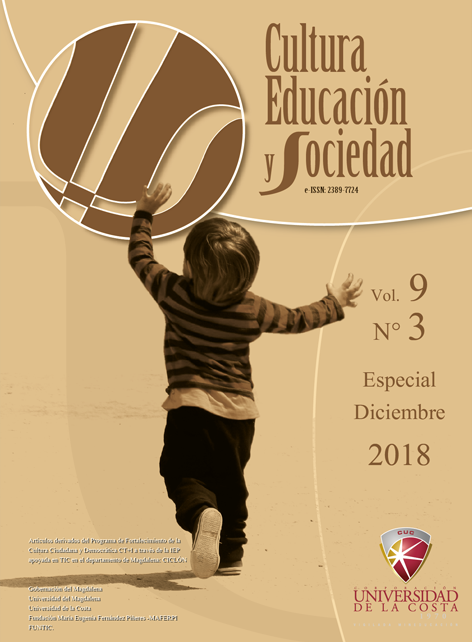Problem-based learning and the Inverted Classroom as a learning strategy for the development of maths.
DOI:
https://doi.org/10.17981/cultedusoc.9.3.2018.04Keywords:
Problem-based learning, Inverted classroom, Mathematical competences.Abstract
Any change in the educational field must originate with the identification and approach of pedagogical problems to achieve the academic quality of the teachers and the other actors involved. The objective of the project was to make a diagnosis of the mathematical competences through the Knowledge Saber of 3 ° to design strategies based on the PBL and the Inverted Classroom as tools that facilitate learning and encourage motivation and concentration in this specific subject. The study was descriptive. The population was conformed by the students of third degree of the IED Rural San Pedro Apóstol, where an analysis of the results of their tests was made, evidencing weakness in the approaches and interpretations of mathematical problems. For this reason, it became necessary to implement these two methodological tools to improve the reasoning capacity and accentuate a solid critical thinking in students.
Downloads
References
Cruz, E. (2016). El ciclo de protesta 2010-2016 en Colombia. Una explicación. Jurídicas CUC, 12 (1), 31-62. DOI: http://dx.doi.org/10.17981/juridcuc.12.1.2016.3.
Del Piño, B., Prieto, B., Prieto, A., y Illeras, F. (2016). Utilización de la Metodología de Aula Invertida en una Asignatura de Fundamentos de Informática. Enseñanza y Aprendizaje de Ingeniería de Computadores, 70.
Gobernación del Magdalena (2018). Proyecto CICLÓN, Departamento del Magdalena, Colombia, Disponible en: http://programaciclon.edu.co/ciclon/que-es-ciclon/
ICFES (2016). Guía de Interpretación y Uso de Resultados de las Pruebas Saber 3°, 5° y 9°. Bogotá.
Jofré, C. y Contreras, F. (2013). Implementación de la Metodología ABP en Estudiantes de Primer Año en la Carrera de Educación Diferencial. Estudios Pedagógicos, 102.
Ministerio de Educación Nacional (MEN), (2014). Plan de Desarrollo Sectorial. Plan Anticorrupción y Atención al ciudadano. Colombia. Disponible en: https://www.mineducacion.gov.co/1759/w3-article-337490.html
Merla, E. y Yánez, C. (2016). El Aula Invertida como Estrategia para la Mejora del Rendimiento Académico. Revista Mexicana de Bachillerato a Distancia, 74.
Morales, P. y Landa, V. (2004). Aprendizaje Basado en Problemas. Theoria, 154.
Restrepo, B. (2017). Aprendizaje Basado en Problemas (ABP). Una Innovación Didactica para la Enseñanza Universitaria. Pedagogía Universitaria, 10.
Saavedra, E.; Illesca, M. y Cabezas, M. (2014). Aprendizaje Basado en Problemas (ABP) como Estrategia para la Adqusición de Competencias Genéricas: Estudiantes de Nutrición y Dietética. Revista Chilena de Nutrición, 3.
Vera, A., Reyes, D. y Robles, J. (2017). El Aprendizaje Basado en (ABP) como Estrategia para Favorecer el Aprendizaje en la Materia de Desarrollo Sustentable dentro del ITSPR. Congreso de Educación y Globalización, (pág. 4). Costa Rica.
Vizcarro, C. y Juárez, E. (2014). La Metodología del Aprendizaje Basado en Problemas. Madrid.
Reina Neira, M., Gómez De la Hoz, L., Felizzola Jiménez, H., & Hualpa Zuñiga, A. (2016). Aprendizaje basado en problemas para la enseñanza de diseño experimental. INGE CUC, 12(2), 86-96. https://doi.org/10.17981/ingecuc.12.2.2016.09
Downloads
Published
How to Cite
Issue
Section
License
Copyright (c) 2018 CULTURA EDUCACIÓN Y SOCIEDAD

This work is licensed under a Creative Commons Attribution-NonCommercial-NoDerivatives 4.0 International License.
![]()
Creative Commons 2020 CULTURA EDUCACIÓN Y SOCIEDAD
This article is under international license Creative Commons Reconocimiento-NoComercial-SinObrasDerivadas 4.0.
The published articles are the sole responsibility of their authors and do not necessarily reflect the opinions of the editorial committee.
CULTURA EDUCACIÓN Y SOCIEDAD respects the moral rights of its authors, who assign to the editorial committee the patrimonial rights of the published material. In turn, the authors inform that this work is unpublished and has not been previously published.
All articles are under a:
Licencia Creative Commons Atribución-NoComercial-SinDerivadas 4.0 Internacional.
![]()


 English
English
 Español (España)
Español (España)




_12.53_.27_p_. m_._3.png)





_12.57_.35_p_. m_._3.png)
_12.50_.37_p_. m_._3.png)



